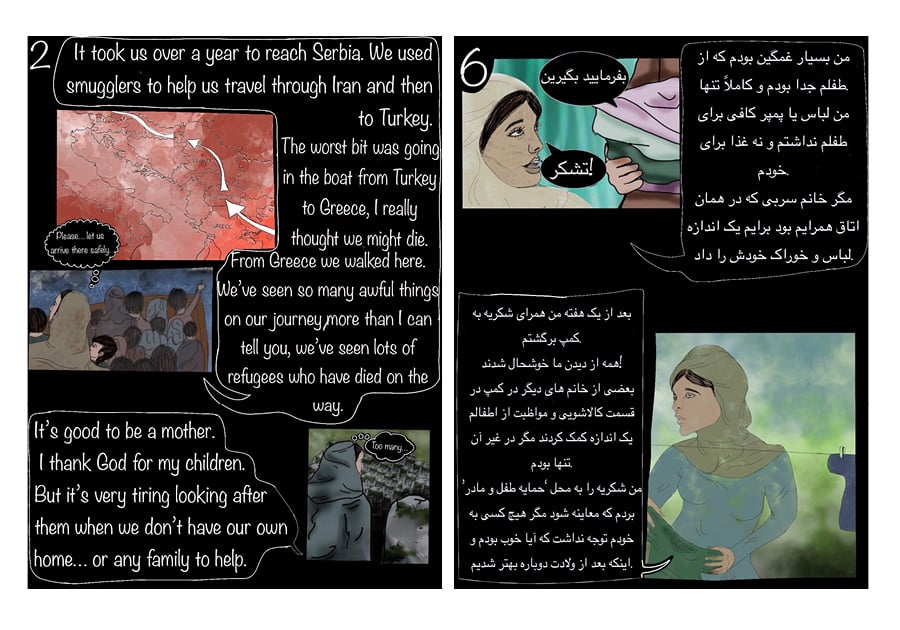On World Refugee Day, we spoke to Esther Sharma, Research Degree student and midwife, who is exploring the perinatal experiences of Afghan women in Serbia.
Tell us about your project, Birthing on the Way:
The Birthing on the Way research project aims to understand Afghan women's experiences, as well as the perspectives of those working in various capacities with these women during pregnancy or birth in Serbia.
It is hoped that this research will firstly, provide a platform for Afghan women's voices regarding their birthing experiences, and secondly, that these experiences, in conjunction with the experiences of professionals working with Afghan women in Serbia, will help to inform the way that NGO's and health professionals provide health care and support to Afghan women in Serbia during pregnancy, birth and early weeks with a newborn.
Why Serbia?
Serbia is a country through which large numbers of people travelling overland from Afghanistan pass through on their way to Western European countries. As a result of the measures that the European Union has implemented to limit migrants entering it's borders, many refugees have found themselves spending months or even years in Serbia while they wait to cross into European Union countries. Some Afghan women arrive in Serbia already pregnant, and others become pregnant or give birth while in Serbia. However, there is very little research that has explored the experiences of women who are pregnant, give birth or have a newborn baby while still navigating their migratory journey.
What did you find?
One of the key findings from the research project is the enormous impact that border regimes have on maternal and newborn health, because of the risks that women have to take when crossing borders during pregnancy or with a newborn. Some women and families opt to pause their journey, staying in refugee camps in Serbia during pregnancy and after the birth, but camp conditions generally adversely impact maternal wellbeing. That said, one of the participants had a very supportive and positive experience of living in a camp while she was pregnant and after the birth, which shows that it is possible for things to be different.
The thing that surprised me the most was the fact that in Serbian hospitals, women are not allowed a birth companion and it is routine for newborns to be separated from their mothers after birth. Many participants found this extremely upsetting, as they were unable to communicate during the birth and were very confused as to what happened to their baby after the birth.
You produced a webcomic from the narrative interviews conducted during the project. What inspired you to produce this resource?
I feel really strongly that as researchers, we have a responsibility to make our work accessible to non-academic audiences, and this is what inspired me to develop the webcomic, brought to life by a fantastic artist, Shae White. It was created from interviews with Afghan women, and with their input and feedback, which was really helpful. I remember one woman, in particular, commenting that it was both simultaneously beautiful and painful to read. Translating it into Serbian has enabled me to disseminate it among Serbian health professionals as a means to raise awareness of Afghan refugee women’s experiences while transiting through Serbia, and I have plans for further dissemination too.
How did you reach the women you interviewed?
It was very challenging to recruit highly-mobile participants for this study. I heard of many women who only stayed in Serbia for a few days, so by the time I tried to reach them in the camp, they had left. However, I am very grateful to an NGO who facilitated access to participants, in addition to participants who took the time to introduce me to other women they were in contact with who had travelled through Serbia.
What were the challenges?
In addition to recruitment being very challenging, I feel a great responsibility to represent the Afghan women’s narratives faithfully, and to do what I can to use this very small study to raise awareness of maternal and newborn health needs for women on the move. I am also constantly challenged to move away from the common stereotype of refugee women as vulnerable and pitiful.
The theme of this year’s World Refugee Day is ‘Hope away from home. A world where refugees are always included’. What does this mean to you?
This is a big question! For me, it means that dignity is maintained for those who are forcibly displaced and are seeking sanctuary, whether that be through appropriate accommodation, availability of proper hygiene and sanitation, the right to work or be educated, and of course, access to sensitive and respectful health care.
What are your hopes for the future of this work?
I would love to be able to continue to build on this work in so many different directions! A longitudinal study exploring perinatal experiences of refugee women on the move would develop some of my findings further. I’m also interested in further Serbian-based research, as it continues to be a transit country for refugees, yet the refugee response with respect to maternal and newborn health is currently underdeveloped.
Where can people learn more about your research?
The Birthing On The Way website includes the webcomic, articles and research papers.
Our postgraduate taught courses provide health practitioners, clinicians, policy-makers, scientists and recent graduates with a world-class qualification in public and global health.
If you are coming to LSHTM to study a distance learning programme (PG Cert, PG Dip, MSc or individual modules) starting in 2024, you may be eligible for a 5% discount on your tuition fees.
These fee reduction schemes are available for a limited time only.

